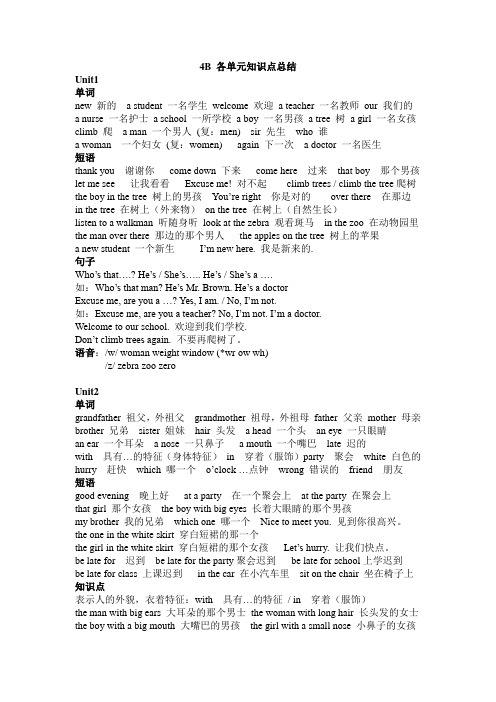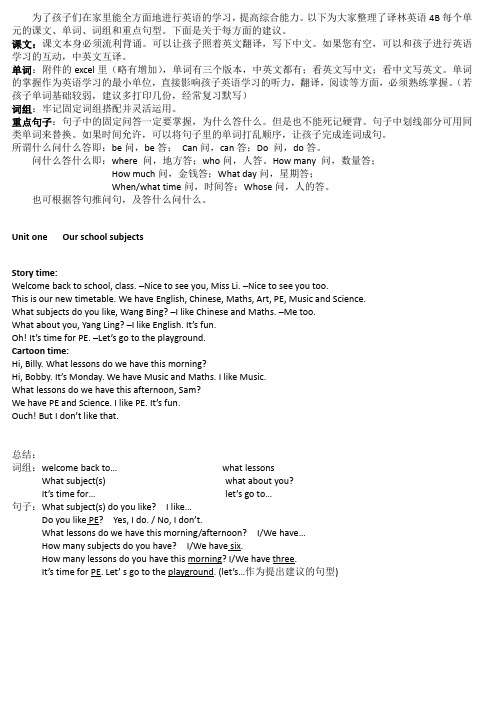4b英语单元重点背诵
- 格式:doc
- 大小:28.50 KB
- 文档页数:3

小学牛津英语4B知识点总结牛津小学英语是最经典的小学英语教材之一,对于小学生的英语学习起到了非常重要的作用。
其中4B是牛津小学英语的四年级下册内容,主要涉及语法、词汇、句型等方面的知识。
下面将对小学牛津英语4B的知识点进行总结。
一、词汇1. 序数词:first, second, third, fourth, fifth, sixth, seventh, eighth, ninth, tenth2. 数词:one, two, three, four, five, six, seven, eight, nine, ten3. 筷子的用法:chopsticks4. 交通工具:bus, taxi, bike, underground, train5. 数字:zero, ten, twenty, thirty, forty, fifty, sixty, seventy, eighty, ninety, one hundred6. 事物:boat, kite, doll, car, bicycle, umbrella, pen, pencil, book7. 人物:father, mother, brother, sister, friend, teacher, student8. 食物:hamburger, apple, orange, banana, sandwich, ice cream, milk, juice, bread, rice9. 颜色:red, blue, yellow, green, orange, black, white10. 音乐乐器:piano, violin, guitar, drums, flute11. 动物:dog, cat, monkey, panda, rabbit, bird, fish, elephant, tiger, lion12. 日期:Monday, Tuesday, Wednesday, Thursday, Friday, Saturday, Sunday二、语法1.一般现在时:主语+动词原形/第三人称单数现在时形式;e.g. I like music. He likes music.2. 物主代词:my, your, his, her, itse.g. This is my book.3.反意疑问句:陈述部分否定,疑问部分用否定的形式;陈述部分肯定,疑问部分用肯定的形式。

九年级上册英语第二单元4b知识点第一部分:问候与介绍在学习一门新语言时,我们首先需要掌握的就是基本的问候和介绍。
以下是一些常用的表达方式:1. 问候- Good morning/afternoon/evening!(早上/下午/晚上好!)- How are you?(你好吗?)- How's everything going?(一切都好吗?)- How's your day?(你今天过得怎么样?)2. 自我介绍- My name is Alice.(我叫艾丽斯。
)- I'm 14 years old.(我今年14岁。
)- I'm from China.(我来自中国。
)- Nice to meet you.(很高兴见到你。
)在日常生活中,学会用正确的方式进行问候和介绍,可以帮助我们与他人建立起良好的交流关系,增进了解。
第二部分:谈论爱好与兴趣在平时的交流中,谈论自己的爱好和兴趣是一个很常见的话题。
以下是几种常见的表达方式以及相关词汇:1. 询问爱好- What do you like doing in your free time?(你空闲时间喜欢做什么?)- Are you interested in playing football?(你对踢足球感兴趣吗?)- Do you have any hobbies?(你有什么爱好吗?)2. 回答爱好- I enjoy reading books.(我喜欢读书。
)- I love playing basketball.(我热爱打篮球。
)- My hobbies include painting and playing the piano.(我喜欢绘画和弹钢琴。
)3. 扩展话题- How often do you practice playing the piano?(你多久练习一次钢琴?)- Have you ever participated in any painting competitions?(你有参加过画画比赛吗?)通过与他人分享自己的爱好和兴趣,我们可以找到共同点,进一步加强彼此的交流和了解。


4B 各单元知识点总结Unit1单词new 新的 a student 一名学生welcome 欢迎a teacher 一名教师our 我们的a nurse 一名护士a school 一所学校a boy 一名男孩a tree 树a girl 一名女孩climb 爬 a man 一个男人(复:men) sir 先生who 谁a woman 一个妇女(复:women) again 下一次 a doctor 一名医生短语thank you 谢谢你come down 下来come here 过来that boy 那个男孩let me see 让我看看Excuse me! 对不起climb trees / climb the tree爬树the boy in the tree 树上的男孩You’re right 你是对的over there 在那边in the tree 在树上(外来物)on the tree 在树上(自然生长)listen to a walkman 听随身听look at the zebra 观看斑马in the zoo 在动物园里the man over there 那边的那个男人the apples on the tree 树上的苹果a new student 一个新生I’m new here. 我是新来的.句子Who’s that….? He’s / She’s….. He’s / She’s a ….如:Who’s that man? He’s Mr. Brown. He’s a doctorExcuse me, a re you a …? Yes, I am. / No, I’m not.如:Excuse me, a re you a teacher? No, I’m not. I’m a doctor.Welcome to our school. 欢迎到我们学校.Don’t climb trees again. 不要再爬树了。

四年级上册英语人教版第四单元B部分笔记笔记主题:动物世界一、词汇与句型1. 动物名称1) lion (n. 狮子)2) tiger (n. 老虎)3) elephant (n. 大象)4) giraffe (n. 长颈鹿)2. 句型1) What animal is it? (它是什么动物?)2) It's a lion. (它是一只狮子。
)3) How many lions are there? (有多少只狮子?)4) There are three lions. (有三只狮子。
)二、语音与拼读1. 单词读音1) lion (/'laɪən/): 元音音标 /aɪ/2) tiger (/ˈtaɪɡər/): 元音音标 /aɪ/3) elephant (/ˈɛlɪfənt/): 元音音标 /ɛ/4) giraffe (/dʒɪˈræf/): 元音音标/æ/2. 发音练习1) 练习元音音标 /aɪ/ 的发音2) 练习元音音标 /ɛ/ 的发音3) 练习元音音标/æ/ 的发音三、阅读与写作1. 阅读理解1) 阅读短文,回答问题(1) What animals can you see in the zoo?(2) How many tigers are there in the zoo?(3) Are there any giraffes in the zoo?2. 写作练习1) 描述自己喜欢的动物及原因2) 描述一次去动物园的经历四、主题活动1. 观察与交流1) 前往动物园观察各种动物,并记录下观察到的动物种类和数量2) 和同学交流自己在动物园的观察感受和体会2. 创意DIY1) 制作动物手工2) 利用废物制作动物模型五、课外拓展1. 观看有关动物的纪录片或动画1) 介绍豹子、犀牛和考拉的生活习性2)介绍非洲大草原上的狮群和斑马群2. 阅读动物故事1) 《小猫钓鱼》2) 《狮子王》六、学习反思与总结1. 分组展示1) 分组展示动物观察成果2)共享自己喜欢的动物并陈述理由2. 总结学习成果1) 小组合作总结动物世界的知识2) 自我总结此次学习的收获和体会以上是我学习四年级英语人教版第四单元B部分的笔记,希望对大家有所帮助。

为了孩子们在家里能全方面地进行英语的学习,提高综合能力。
以下为大家整理了译林英语4B每个单元的课文、单词、词组和重点句型。
下面是关于每方面的建议。
课文:课文本身必须流利背诵。
可以让孩子照着英文翻译,写下中文。
如果您有空,可以和孩子进行英语学习的互动,中英文互译。
单词:附件的excel里(略有增加),单词有三个版本,中英文都有;看英文写中文;看中文写英文。
单词的掌握作为英语学习的最小单位,直接影响孩子英语学习的听力,翻译,阅读等方面,必须熟练掌握。
(若孩子单词基础较弱,建议多打印几份,经常复习默写)词组:牢记固定词组搭配并灵活运用。
重点句子:句子中的固定问答一定要掌握,为什么答什么。
但是也不能死记硬背。
句子中划线部分可用同类单词来替换。
如果时间允许,可以将句子里的单词打乱顺序,让孩子完成连词成句。
所谓什么问什么答即:be问,be答;Can问,can答;Do 问,do答。
问什么答什么即:where 问,地方答;who问,人答。
How many 问,数量答;How much问,金钱答;What day问,星期答;When/what time问,时间答;Whose问,人的答。
也可根据答句推问句,及答什么问什么。
Unit one Our school subjectsStory time:Welcome back to school, class. –Nice to see you, Miss Li. –Nice to see you too.This is our new timetable. We have English, Chinese, Maths, Art, PE, Music and Science.What subjects do you like, Wang Bing? –I like Chinese and Maths. –Me too.What about you, Yang Ling? –I like English. It’s fun.Oh! It’s time for PE. –Let’s go to the playground.Cartoon time:Hi, Billy. What lessons do we have this morning?Hi, Bobby. It’s Monday. We have Music and Maths. I like Music.What lessons do we have this afternoon, Sam?We have PE and Science. I like PE. It’s fun.Ouch! But I don’t like that.总结:词组:welcome back to…what lessonsWhat subject(s) what about you?It’s time for…let’s go to…句子:What subject(s) do you like? I like…Do you like PE? Yes, I do. / No, I don’t.What lessons do we have this morning/afternoon? I/We have…How many subjects do you have? I/We have six.How many lessons do you have this morning? I/We have three.It’s time for PE. Let’ s go to the playground. (let’s…作为提出建议的句型)Unit two After schoolStory time:Hi, Mike. Let’s go and play table tennis. –What day is it today? –It’s Wednesday. –Sorry, I have a football match today.Hi, Su Hai. Come and play table tennis.- Sorry, I have a swimming lesson.What about Su Yang? –She has a swimming lesson too. –What a pity!What about Saturday? We don’t have any lessons on Saturday. –All right.Cartoon time:Get up! Get up!Good morning. Bobby. When do you get up every day? –At six.I get up at five.What lessons do you have today? What day is it? It’s Saturday. Ah! I don’t have any lessons on Saturday.词组:play table tennis a swimming lesson an English lessonget up on Sundayat five a football match句子:What day is it? It’s Monday.When do you get up? At six.I have a swimming lesson. I don’t have a swimming lesson.What about Su Yang? She has a swimming lesson.I like English. I don’t like Music.What about Su Yang? She likes Chinese.I don’t have any lessons on Sunday. (any用于否定句。
Unit 1 Our school subjects 知识点归纳班级____________ 姓名_____________ 学号_____________Words 单词1. school 学校2. Art 美术(课)3. Chinese 语文(课) .4. English 英语(课)5. Maths 数学(课)6. Music 音乐(课)7. PE 体育(课)8. Science 科学(课)9. subject 课程、科目10. lesson 课11. see 看见,看到12. Monday 星期一13. timetable 课程表,时间表14. fun 乐趣,快乐15. playground 操场16. afternoon 下午17. write 写18. change 改变,交换19. funny 有趣的20. think 想,认为Phrases词组1.our school subjects 我们的学校课程2.back to school 回到学校3. see you 见到你4. our new timetable 我们的新课程表5. Music and Science 音乐和科学6. what subjects 什么课程7. Chinese and Maths 语文和数学8. like English 喜欢英语9. go to the playground 去操场10. go to school 去上学11. English and Art 英语和美术12. what lessons 什么课13. have Music and Maths有音乐课和数学课14. this morning 今天早上15. this afternoon 今天下午16. have PE and Science有体育课和科学课17. like PE 喜欢体育课18. make a cake 做一个蛋糕19. all like English 都喜欢英语20. at school 在学校Sentences句型1. Welcome back to school, class. 欢迎回到学校,同学们。
Unit 1 Our school subjects知识点归纳短语1.our school subjects 我们的学校课程2.back to school 回到学校3. see you 见到你4. our new timetable 我们的新课程表5. Music and Science 音乐和科学6. what subjects 什么课程7. Chinese and Maths 语文和数学8. like English 喜欢英语9. go to the playground 去操场10. go to school 去上学11. English and Art 英语和美术12. what lessons 什么课13. have Music and Maths 有音乐课和数学课14. this morning 今天早上15. this afternoon 今天下午16. have PE and Science 有体育课和科学课17. like PE 喜欢体育课18. make a cake 做一个蛋糕19. all like English 都喜欢英语20. at school 在学校句子1. Welcome back to school, class. 欢迎回到学校,同学们。
2. Nice to see you. 很高兴见到你。
3. This is our new timetable. 这是我们的新课程表。
4. What subjects do you like? 你喜欢什么课程?5. I like Chinese and Maths. 我喜欢语文课和数学课。
6. Me too. 我也是。
7. It’s fun. 它很有趣。
8. It’s time for PE. 该是上体育课的时间了。
9. Let’s go to the playground. 让我们去操场吧。
10. What lessons do we have this morning? 今天上午我们有什么课?11. We have Music and Maths. 我们有音乐课和数学课。
牛津4BM3U1 背诵内容一、单词、词组sound(s) / saʊnd/ 声音1.quiet / 'kwaɪət / 安静的quite /kwaɪt/ 十分、相当2.noisy / 'nɔɪzi / 吵闹的(反义词:quiet)3.noise / nɔɪz/ 喧闹声make no noise 不发出噪音4.loud / laʊd / 响的(反义词:low)5.bell(s) / bel / 铃铛bicycle bell 车铃doorbell 门铃wind-bell 风铃6.television(s) / 'telɪvɪʒn / 电视机缩写形式TV7.outside /ˌaʊt'saɪd/ 在外面(反义词:inside 在里面)8.student(s) /'stjuːdnt/ 学生9.thick /θɪk/ 厚的(反义词:thin 薄的)10.crayon(s) / 'kreɪən/ 蜡笔11.string / strɪŋ/ 线(不可数名词) some string12.scissors / 'sɪzəz / 剪刀 a pair of scissors 一把剪刀13.different / 'dɪfrənt/ 不同的(反义词:same /seɪm/ 相同的)14.careful / 'keəfl/ 小心谨慎的、仔细的Be careful! 当心!15.excuse /ɪk'skjuːz/ 原谅Excuse me! 对不起,打扰一下!16.man / mæn/ 男人(复数:m e n)dy / 'leɪdi/ 女士(复数:lad ies)18.awake /ə'weɪk/ 醒着的、清醒的19.puzzled / 'pʌzl d/ 困惑的20.doze [dəʊz] 打瞌睡21.nap / næp/ 小睡have/take a nap 打盹ter / 'leɪtə/ 后来 a week later 一周之后23.unhappy /ʌn'hæpi/ 不高兴的un happy/un kind/un friendly/un helpful un=not24.wheel(s) /wiːl/ 轮子the wheel on the bike 自行车上的轮子动词(原形、现在分词、第三人称单数):25.ring / rɪŋ/ 响(第三人称单数:ring s) (现在分词:ring ing)Is the doorbell ringing? 是门铃在响吗?26.make /meɪk/ 制作(第三人称单数:make s) (现在分词:mak ing)make a wind-bell 制作风铃make two holes in each shape 在每个形状里制作两个洞27.draw /drɔː/ 画画(第三人称单数:draw s) (现在分词:draw ing)draw different shapes on the thick card 在厚卡纸上画不同的形状28.colour / 'kʌlə/ 涂颜色(第三人称单数:colour s) (现在分词:colour ing)colour them with crayons 用蜡笔涂颜色29.cut /kʌt / 剪(第三人称单数:cut s) (现在分词:cu tting)cut out the shapes 把形状剪下cut up 剪碎30.tie / taɪ/ 系(第三人称单数:tie s) (现在分词:t ying)tie the shapes and the bell with some string 用线系上形状和铃铛31.ride /raɪd/ 骑(第三人称单数:ride s) (现在分词:rid ing)ride his bicycle in the S ports P ark骑自行车32.doze /dəʊz/ 读(第三人称单数:doze s) (现在分词:doz ing)Two old ladies are dozing on the bench.33.feel /fiːl/ 感觉到(第三人称单数:feel s) (现在分词:feel ing)feel angry 感到生气34.have / hæv / 有(第三人称单数:has) (现在分词:hav ing)have a nap 打瞌睡35.live /lɪv/ 住(第三人称单数:live s) (现在分词:liv ing)live by a small pond 住在一个小池塘旁36.sing / sɪŋ/ 唱歌(第三人称单数:sing s) (现在分词:sing ing)sing some songs 唱歌37.cry /kraɪ/ 哭(第三人称单数:cr ies) (现在分词:cry ing)cry in fear38.fly /flaɪ/ 飞(第三人称单数:f ies) (现在分词:fly ing)fly away 飞走39.drink / drɪŋk/ 喝(第三人称单数:drink s) (现在分词:drink ing)drink some water 喝水40.think /θɪŋk/ 想(第三人称单数:think s) (现在分词:think ing)41.go /ɡəʊ/ 走(第三人称单数:go es) (现在分词:go ing)go near that square/bear 靠近那个方块/那只熊The bell on the bike goes “Ting, ting, ting.”42.say /seɪ/ 说(第三人称单数:say s /sez/) (现在分词:say ing)The girl on the bike says “Excuse me!”二、句子1.彼得的自行车有一个新铃铛.他正在运动公园里骑车.Peter has a new bell for hisbicycle. He is riding his bicycle in the Sports Park.2.我听不到你的铃声。
请在家背上,可以打印下来贴在书上,4月7日到校默写。
Unit 1
a new student 一个新生a new teacher一个新老师
I’m new here. 我是新来的. Welcome to our school. 欢迎到我们学校. excuse me 打扰一下the boy in the tree 树上的那个男孩
let me see 让我看看come down 下来climb trees 爬树
listen to a walkman 听随身听look at the zebra 观看斑马
in the zoo 在动物园里come here 过来
the man over there 那边的那个男人
Unit 2
good evening 晚上好at a party在聚会上my brother 我的弟弟/哥哥the boy with big eyes大眼睛的那个男孩
nice to meet you 见到你很高兴
the one in the white skirt 那个穿着白色短裙的which one 哪一个
the man with a big mouth那个大嘴巴的男人
the one in red那个穿红衣服的
the girl with a small nose 那个小鼻子的女孩
be late for the party聚会迟到
the woman with long hair那个长头发的妇女be late for school上学迟到
the boy with big ears 大耳朵的那个男孩be late for class 上课迟到the one in the green shirt 那个穿着绿色衬衫的
Let’s go . 我们走吧
the one in the yellow jacket 那个穿着黄色茄克的
Let’s hurry.我们赶快吧. in the car 在小汽车里
my grandfather 我的祖父/我的外祖父
Unit3
your job 你的职业your name 你的名字how old多大(年龄)their jobs 他们的职业her/ his job 她/他的职业
a policeman 一个警察my good friend我的好朋友
her small eyes她的小眼睛the boy with big ears 大耳朵男孩
the girl with a big mouth大嘴巴女孩 her long hair她的长头发
Y ou’re right. 你是对的。
Look at that old woman 看那个老太太。
an old woman 一个老太太about sixty 大约六十岁
the one in the red sweater那个穿红色毛衣的
boys and girls 孩子(们)how much多少(钱)
want to be a teacher 想要成为一个老师
the driver’s dress 司机的裙子how many 多少(数量)
补充:the police警察police dog警犬 a bus driver公交车司机cook sb’s goose 毁掉某人成功的机会cookbook菜谱,食谱
cooker 炊具,厨具farm农场 a pig farm 养猪场Unit 4
buy fruit 买水果 some grapes 一些葡萄 some pears一些梨
I’d like我想要Here you are给你these apples这些苹
果those orange那些桔子 these peaches 这些桃子
how many kilos ?多少公斤? three kilos三公斤
one kilo一公斤these or those?这些还是那些?
I think我想,我认为 eight yuan 8 元very thin很瘦
Can I help you?我能为你效劳吗? the red ones 红色的那些
Here you are. 给你 those dogs over there那边的那些狗
3 kilos of bananas 三公斤香蕉one kilo of apples一公斤苹果
补充: the apple of one's eye掌上明珠top banana大老板
the Big Apple纽约城 a lemon没有价值的商品An apple a day keeps the doctor away.[谚] 一天一苹果, 医生不找我(比喻不生病)
a bad apple 害群之马apples and oranges风马牛不相及。